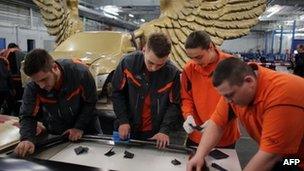Minimum wage to increase to £6.31
- Published
Business Secretary Vince Cable: "Nobody in the country should be paid less than the minimum wage"
The national minimum wage is to rise by 12p an hour to £6.31 for adults and by 5p to £5.03 for 18-to-20-year-olds from October, the government has announced.
Business secretary Vince Cable said the government accepted the recommendation of the Low Pay Commission.
However, although the Commission said the rate for apprentices should be frozen, Mr Cable said it would rise by 3p to £2.68 an hour.
The increases are below current inflation levels.
Retail Prices Index (RPI) inflation currently stands at 3.2% and the Consumer Prices Index (CPI) at 2.8%.
Business Secretary Vince Cable said: "The independent Low Pay Commission plays a crucial role in advising the government when setting the national minimum wage every year. It balances wages of low paid workers against employment prospects if the rate was set too high.
"We are accepting its recommendations for the adult and youth rate increases, which I am confident strikes this balance. However, there is worrying evidence that a significant number of employers are not paying apprentices the relevant minimum wage rate.
"Apprenticeships are at the heart of our goal to support a stronger economy, and so it is important to continue to make them attractive to young people. Therefore, I am not taking forward the LPC's recommendation to freeze the apprenticeship rate due to non-compliance, but instead am raising it in line with the youth rates.
"We are working on a series of tough new measures to ensure we tackle non-compliance issues across the board."
Ian Murray MP, Labour's shadow minister for employment relations, consumer and postal affairs, welcomed the announced rise to the minimum wage.
"However, the government needs to do more to enforce the minimum wage in workplaces and get tough on rogue employers who break the law, and there are still concerns on the implications of recent changes to the Commission's remit," he said.
"Ed Miliband has also been leading calls for a living wage and Labour will continue to press ministers to back the campaign and promote the living wage."
'Modest' increase
The EEF manufacturers' organisation said the rises struck a delicate balance between the need for pay increases and the limitations employers faced in awarding rises.
"The modest increase in the apprenticeship rate is unlikely to negatively affect apprenticeship recruitment and of much greater importance is the raising of apprenticeships standards, better information and advice to students and ensuring that apprenticeships are truly employer-led and employer-driven," the EEF said.

Employers said the rise struck a balance between the need for wage increases and firms' ability to pay
However, the British Chambers of Commerce said the increase in the adult rate would add to the cost pressures on business, although it called the rises for youth workers and apprentices "restrained".
Dr Adam Marshall, the BCC's director of policy, said: "We are disappointed that the government has chosen to raise the adult national minimum wage rate by 1.9%, an increase that is over 50% higher than current average pay growth.
"While the pressures of inflation are affecting many people, including the lowest-paid, the scale of this rise adds significantly to business costs, most of all by contributing to broader pay inflation. It will also make some employers less inclined to hire additional members of staff."
TUC general secretary Frances O'Grady said: "Boosting the incomes of the low-paid goes straight into the economy and wage-led growth must be part of the recovery, so we would have liked to have seen minimum wage rates go up further today, even if the government has rightly rejected calls for a freeze.
"But we are pleased that ministers have increased the apprenticeship rate. This sends a positive signal about the importance of apprentices."
- Published19 March 2013
- Published13 February 2013